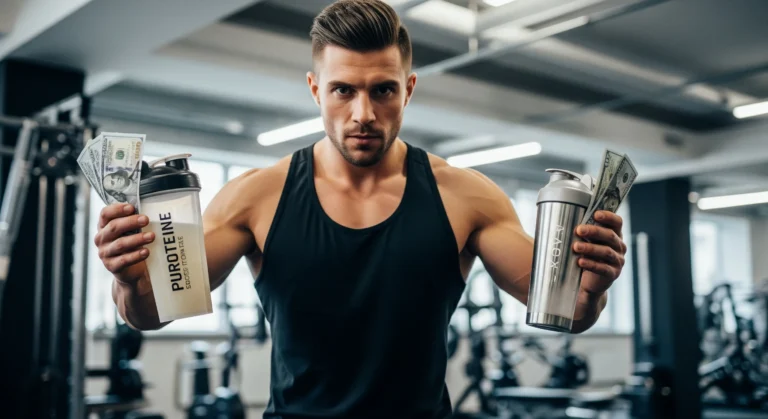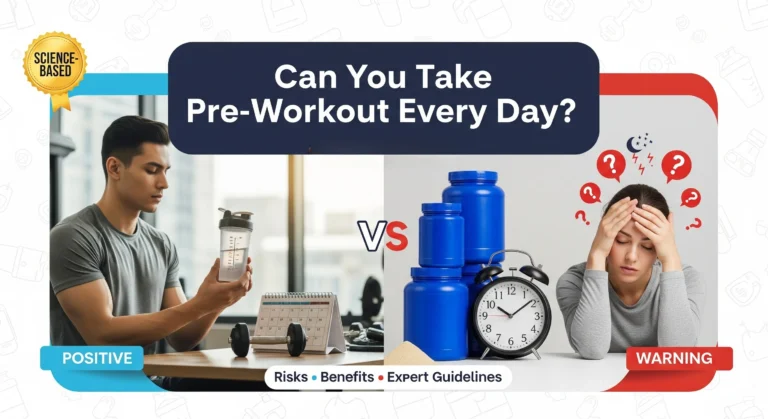
Ever stood in your kitchen at 5 AM, staring at your coffee maker and your pre-workout container, wondering which one will actually get you through that brutal leg day? The pre-workout or coffee debate has been keeping fitness enthusiasts up at night (ironically) for years!
According to recent fitness surveys, over 78% of gym-goers rely on some form of caffeine before their workouts, but choosing between pre-workout or coffee continues to divide fitness communities worldwide. Both options promise to energize your workouts, but they deliver that energy in completely different ways.
I’ll be honest – I’ve been team coffee, then team pre-workout, then back to coffee again more times than I care to admit. There was a time when I thought spending $40 on pre-workout was just fancy marketing, until I experienced the difference firsthand during a particularly intense deadlift session. But then again, there are days when a simple cup of black coffee does the trick just as well, and my wallet definitely appreciates it more!
The pre-workout or coffee choice isn’t just about caffeine content – it’s about understanding how each option affects your energy levels, workout performance, and even your budget. Let me break down everything I’ve learned about this caffeinated conundrum so you can finally settle the pre-workout or coffee debate for yourself.
Caffeine Content Comparison: Pre-Workout vs Coffee
Here’s where things get interesting, and honestly, where I made my first big mistake years ago. I used to think all caffeine was created equal – boy, was I wrong!
Most pre-workout supplements pack between 150-400mg of caffeine per serving. That’s a pretty wide range, right? I learned this the hard way when I switched from my usual brand to a new one without checking the label. Let’s just say I felt like I could bench press a car, but also couldn’t sit still for three hours afterward.
Your typical cup of coffee, on the other hand, contains around 95-200mg of caffeine depending on how it’s brewed. A standard 8-ounce cup of drip coffee usually hits around 95mg, while that fancy cold brew you love might pack up to 200mg or more. I’ve noticed that the grind size, brewing method, and even the type of coffee bean makes a huge difference in how much caffeine you’re actually getting.
But here’s what most people don’t realize – it’s not just about the numbers on paper. The way your body absorbs caffeine from pre-workout versus coffee can be completely different. Pre-workout supplements often include other ingredients that can enhance or modify how caffeine affects you, while coffee comes with natural compounds that might slow down absorption.
I remember switching from my morning coffee routine to pre-workout and feeling like the energy hit me like a freight train instead of the gradual wake-up I was used to. That’s because pre-workout is designed for rapid absorption, while coffee tends to provide a more gradual energy increase.
The bottom line? If you’re sensitive to caffeine, start with coffee and work your way up. If you need that intense, immediate energy boost, pre-workout might be your answer – just don’t make my mistake of going overboard on your first try!
Cost Analysis: Which Option Saves You More Money?
Alright, let’s talk money because this is where pre-workout supplements can really hit your wallet hard. I’ve done the math more times than I care to admit, usually while standing in the supplement aisle trying to justify another $45 purchase.
Most quality pre-workout supplements cost between $25-50 for a container with 20-30 servings. That breaks down to roughly $1.25-2.50 per workout. Doesn’t sound too bad until you multiply that by how often you actually hit the gym. For someone working out 5 times per week, you’re looking at $325-650 per year just on pre-workout!
Coffee, on the other hand, is way more budget-friendly if you brew at home. A pound of decent coffee beans costs around $10-15 and makes about 40 cups. That’s roughly $0.25-0.40 per cup – a fraction of what you’d spend on pre-workout. Even if you go for premium beans or add some extras, you’re still looking at maybe $100-150 per year.
But here’s where it gets tricky – and where I fell into a spending trap. If you’re buying coffee from shops before your workouts, those $4-6 lattes add up fast. I was spending nearly $30 per week on pre-workout coffee runs without even realizing it!
There are also hidden costs to consider. With pre-workout, you might want different flavors, or you’ll need to cycle off periodically to reset your tolerance. With coffee, you might invest in better brewing equipment or find yourself wanting higher quality beans as your palate develops.
My advice? If budget is a major concern, stick with home-brewed coffee and maybe invest in a good travel mug. You can always add natural energy boosters like a pinch of cinnamon or a dash of coconut oil. But if the convenience and performance benefits of pre-workout justify the cost for you, consider it an investment in your fitness goals.
Beyond Caffeine: Additional Ingredients That Make a Difference
This is where pre-workout supplements really start to separate themselves from coffee, and honestly, where my skepticism about them began to fade. I used to think caffeine was caffeine, period. Then I started paying attention to what else was in these colorful powders.
Beta-alanine is probably the most noticeable ingredient after caffeine. It’s that tingly sensation you feel in your hands and face about 10 minutes after taking pre-workout. I’ll admit, the first time I experienced it, I thought I was having an allergic reaction! But beta-alanine actually helps buffer acid in your muscles, which can improve endurance during those last few grueling reps.
Citrulline malate is another game-changer that coffee obviously can’t provide. This amino acid helps increase blood flow and can give you better muscle pumps during your workout. I notice a real difference in how my muscles feel and look when I’m using a pre-workout with citrulline versus just relying on coffee.
Then there’s creatine, which some pre-workouts include. While you can definitely take creatine separately, having it combined with your caffeine source can be convenient. Though I’ll be honest – I prefer taking creatine consistently rather than only on workout days, so I usually supplement it separately.
Coffee does have its own unique compounds though. Those antioxidants everyone talks about? They’re real, and they do provide health benefits that synthetic caffeine can’t match. Coffee also contains chlorogenic acids, which might help with fat burning – though the effect is pretty modest.
But here’s what I’ve learned through trial and error: the combination of ingredients in pre-workout can create synergistic effects that you just can’t replicate with coffee alone. When beta-alanine, citrulline, and caffeine work together, the result often feels greater than the sum of its parts.
That said, you’re also getting artificial flavors, colors, and sometimes questionable additives in pre-workout. Coffee is naturally occurring and generally has a cleaner ingredient profile, which matters to some people more than others.
Energy Duration and Crash Comparison
Let me tell you about the day I learned the hard way about caffeine crashes. I had switched from my usual pre-workout to a higher-stim version and felt incredible for about 90 minutes. Then I hit a wall so hard I literally had to sit down in the middle of my workout.
The energy duration from pre-workout versus coffee can be dramatically different, and it mostly comes down to how fast the caffeine hits your system. Pre-workout is designed for rapid absorption – you’ll typically feel the effects within 15-30 minutes, and they’ll peak pretty quickly. This is great for intense workouts, but it can also mean a more noticeable crash afterward.
Coffee tends to provide a more gradual energy curve. The caffeine absorption is slower, which means you might not feel as intense of a peak, but you also typically don’t experience as severe of a crash. I’ve found that coffee energy can last 3-4 hours with a gentle decline, while pre-workout might give me 2-3 hours of intense energy followed by a more abrupt drop-off.
But here’s where individual differences really matter. Some people are fast caffeine metabolizers, while others process it much slower. I’m somewhere in the middle, but I have friends who can drink coffee at 6 PM and sleep fine, while others get jittery from a single cup.
The crash factor also depends heavily on what else you’re consuming. If you’re taking pre-workout on an empty stomach (which many people do for better absorption), you might experience a more severe crash than if you have it with some food. Coffee with a light snack tends to provide more stable energy for me.
I’ve also noticed that the additional ingredients in pre-workout can sometimes help with the crash. L-theanine, found in some formulas, can smooth out the caffeine experience. But this varies widely by product – some pre-workouts leave me feeling great, while others make me feel like I need a nap by 2 PM.
My strategy now? I use pre-workout for my most intense training sessions when I need that peak performance, and stick with coffee for lighter workouts or when I’m training later in the day.
Workout Performance: Which Actually Improves Your Results?
Okay, this is where rubber meets the road – or where barbell meets chest, if you will. After years of experimenting with both options, I can tell you there are real, measurable differences in how they affect workout performance.
When I’m using pre-workout, my strength numbers are consistently higher. I’m talking about being able to squeeze out an extra rep or two on compound movements, or handling slightly heavier weight than usual. There’s actual research backing this up – studies show that pre-workout supplements can increase power output by 5-15% compared to placebo.
But here’s what surprised me: coffee isn’t far behind for certain types of workouts. For steady-state cardio or moderate-intensity training, I honestly can’t tell much difference between a strong cup of coffee and my pre-workout. The real difference shows up during high-intensity, short-duration activities like heavy lifting or HIIT workouts.
The mind-muscle connection is where pre-workout really shines for me. Maybe it’s the combination of caffeine with other nootropic ingredients that some formulas include, but I feel more dialed in and focused during my workouts. My form tends to be better, and I’m more aware of what muscles I’m targeting.
Coffee gives me a different kind of focus – more of a general alertness rather than that laser-sharp concentration I get from pre-workout. It’s perfectly fine for most workouts, but when I’m going for a PR or doing something technically demanding, I definitely notice the difference.
Endurance is another interesting factor. Coffee seems to excel for longer workouts – those 90-minute sessions where you need sustained energy rather than explosive power. Pre-workout can sometimes leave me feeling burned out if I’m doing extended cardio sessions.
One thing I’ve learned is that the placebo effect is real with both options. Sometimes just the ritual of preparing your caffeine source and knowing you’re about to crush your workout is half the battle. Whether that’s brewing the perfect cup of coffee or mixing up your favorite pre-workout flavor, the mental preparation matters.
Side Effects and Health Considerations
Let’s be real about this – both coffee and pre-workout can mess with you if you’re not careful. I’ve experienced my fair share of caffeine-related mishaps over the years, and I want to save you from making the same mistakes.
Pre-workout side effects can be pretty intense, especially when you’re starting out. That beta-alanine tingle I mentioned earlier? Some people hate it so much they switch products just to avoid it. I’ve also dealt with jitters, rapid heartbeat, and trouble sleeping when I took pre-workout too late in the day or used too much.
The artificial ingredients in pre-workout can cause issues for some people too. I know folks who get headaches from certain artificial sweeteners, or stomach upset from various additives. The quality control in the supplement industry isn’t always perfect either – I’ve had batches that seemed way stronger or weaker than usual from the same brand.
Coffee has its own set of potential problems. If you’re drinking it black, it’s generally pretty safe for most people. But it can increase anxiety in sensitive individuals, cause stomach irritation on an empty stomach, and definitely mess with your sleep if consumed too late. I learned this lesson when I switched to afternoon workouts but kept my same caffeine timing.
The biggest health consideration is tolerance buildup. With either option, you’ll likely need more over time to get the same effect. I cycle off caffeine completely for a week every few months to reset my tolerance – it’s not fun, but it keeps both coffee and pre-workout effective.
For people with heart conditions, high blood pressure, or anxiety disorders, the high caffeine content in pre-workout can be risky. Coffee is generally a safer choice for these individuals, but even then, moderation is key.
Pregnancy is another consideration – most doctors recommend limiting caffeine intake, and pre-workout supplements often contain other ingredients that haven’t been studied in pregnant women. Coffee in moderation is usually considered safer.
Drug testing is something athletes need to think about. Most pre-workouts are fine, but some contain banned substances or ingredients that could trigger false positives. Coffee is never an issue in this regard.
Who Should Choose Pre-Workout vs Coffee?
After all this analysis, you’re probably wondering which camp you should join. The truth is, it depends on your specific situation, goals, and preferences.
Pre-workout makes the most sense if you’re serious about strength training or high-intensity workouts. If you’re someone who goes to the gym to push heavy weight, train to failure regularly, or do intense HIIT sessions, the performance benefits of pre-workout can be worth the extra cost. I definitely fall into this category on my heavy training days.
Pre-workout is also great for people who work out early in the morning and need that immediate energy kick. If you’re rolling out of bed at 5 AM to hit the gym, pre-workout can help you feel human faster than waiting for coffee to kick in gradually.
Coffee is the better choice for budget-conscious fitness enthusiasts, people who prefer natural options, or those who do moderate-intensity workouts. If you’re primarily doing cardio, yoga, light weight training, or longer exercise sessions, coffee can provide all the energy you need without the extra expense.
Coffee also makes more sense for people who are sensitive to supplements or have digestive issues. The simpler ingredient profile means fewer potential side effects, and you can control exactly what goes into your body.
If you’re new to caffeine or getting back into fitness after a break, start with coffee. It’s gentler on your system and gives you a better baseline to understand how caffeine affects your workouts.
For people who work out at different times or have varying workout intensities, having both options available might be the best approach. I keep both in my kitchen and choose based on what type of workout I’m planning and how I’m feeling that day.
Conclusion
After diving deep into the pre-workout versus coffee debate, the truth is that both have their place in a fitness enthusiast’s routine. Your choice ultimately depends on your specific goals, budget, workout intensity, and how your body responds to different forms of caffeine.
If you’re someone who thrives on intense, longer workouts and doesn’t mind investing a bit more for potentially enhanced performance, pre-workout supplements might be your best bet. The additional ingredients like beta-alanine and citrulline can genuinely improve your training sessions, especially for strength training and high-intensity workouts.
On the other hand, if you prefer a more natural approach, have budget constraints, or simply enjoy the ritual of coffee, a good cup of joe can absolutely fuel your workouts effectively. Plus, you’ll get those beneficial antioxidants as a bonus!
My advice? Try both approaches and see what works best for your body and lifestyle. Start with coffee if you’re new to pre-workout caffeine, then experiment with supplements if you feel like you need that extra performance boost. Remember, the best pre-workout is the one you’ll actually use consistently.
Whether that’s a carefully formulated supplement or a perfectly brewed cup of coffee, the most important thing is showing up to your workouts energized and ready to crush your goals. Listen to your body, consider your budget, and don’t be afraid to switch things up based on your training phases or life circumstances.
What’s your experience with pre-workout versus coffee? Drop a comment below and share which option has worked better for your fitness journey – I’d love to hear about your caffeinated workout adventures!



